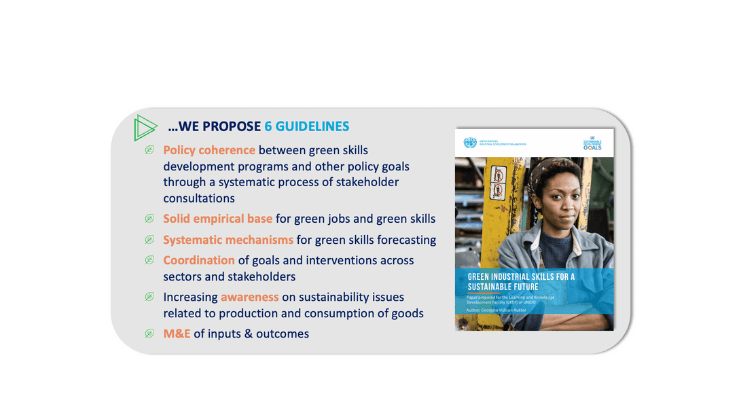The LKDF and Greening: A Snapshot of the Green Skills Paper Presented at the LKDF Forum 2020
The Learning and Knowledge Development Facility promotes industrial skills development
- January 14, 2021
- By Giorgia Epicoco
The Learning and Knowledge Development Facility promotes industrial skills development in emerging economies for increased and improved youth employment.

In 2020, the LKDF strongly supported a green skills agenda, hosting its flagship event, the LKDF Forum, under the theme Green Skills for a Sustainable Future. To ensure a solid evidence base, the LKDF set the stage in October with scientific research explaining the relevance of skills to enable the green transformation in the industrial sector. This was followed by examining upcoming trends in greening the industry in developing countries, the type of skills and competencies expected to play a role, and what interventions may be necessary for such endeavors.
The world is asked to go green and this can happen, but a coordinated effort of public and private actors has to be in place to properly regulate and foster the transition. Change may further be favoured if public policies demand cohesion to multilateral environmental agreements and the 2030 Agenda for Sustainable Development. Additionally, a quick shift to green technologies development and their utilization can contribute to greening the economy, spurring new jobs (ILO 2018). Nevertheless, incentives and guidelines must be provided to market actors to rethink industrial activities in a greener way and mitigate the socio-economic crisis we co-exist with.
New economic activities will demand new skills for new occupations; thus, industries should develop qualifications across diverse sectors. After identifying new skills’ profiles, the skill gap will have to be matched with the necessary quality training programmes in the expanding sectors. A way to target skilling, reskilling and upskilling activities is to examine how green jobs overlap with the pre-existing non-green version of the job, to then retrain the workforce on these new areas and weak points (Bowen et al. 2018). We will observe a reskilling, followed by a change in the necessary skills in new sectors, the upgrading of skills, and the adjustment of qualifications for greener activities and occupations.
Addressing the technological, social, and industrial developments and industrial needs is unquestionably a steppingstone to pertain to the global green plan; this involves critically forecasting the economic situation’s unfolding and market needs in the next decades.
Green skills are to be embedded in all products, services and teaching material to meet the sustainability targets” as Enrico Rühle, Board Member of FESTO Didactic, a long-time partner of UNIDO, said at the LKDF Forum 2020. Thus, market assessment is fundamental to align technical training curricula with future employment opportunities.
We expect engineering, technical skills, science skills, operation management skills, and monitoring skills to be particularly important in the green labour market. Soft skills will also be an essential set to meet the future of work. To better address priorities towards the green transition, it is also necessary to label green jobs and establish a taxonomy for green skills.
So far, green jobs have been defined as “work (…) that contributes substantially to preserving or restoring environmental quality. (…) that helps to protect ecosystems and biodiversity, reduce energy, materials, and water consumption through high-efficiency strategies, decarbonize the economy, and minimize or altogether avoid the generation of all forms of waste and pollution.” (UNEP, ILO, IOE, ITUC, 2008).
Goals can be coordinated and interventions developed by engaging closely with the private sector. The labour market will further adjust to green technology trends accompanied by a policy-based restructuring of work to support setting green standards. Nevertheless, the green action plan needs policy coherence, enabled by a systematic process of stakeholder consultations. A consultative process would also ensure that the private sector receives more guidance and financial and technical support, incentivizing companies to go green. Finally, monitoring and evaluation of inputs and outcomes must be implemented to fulfill market needs and ensure effective policy interventions.
How can we assure that the impacts achieved through green skills development and delivery last over time?


